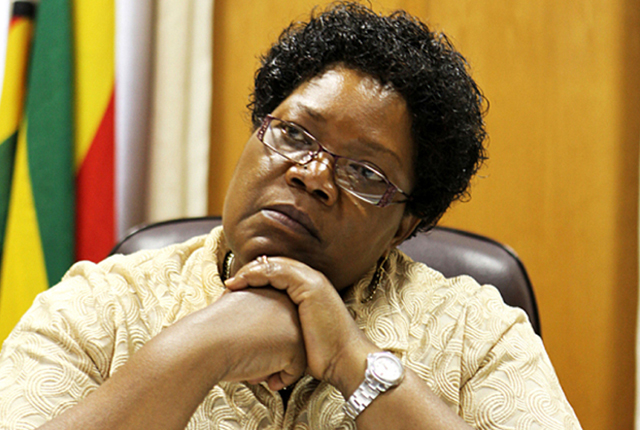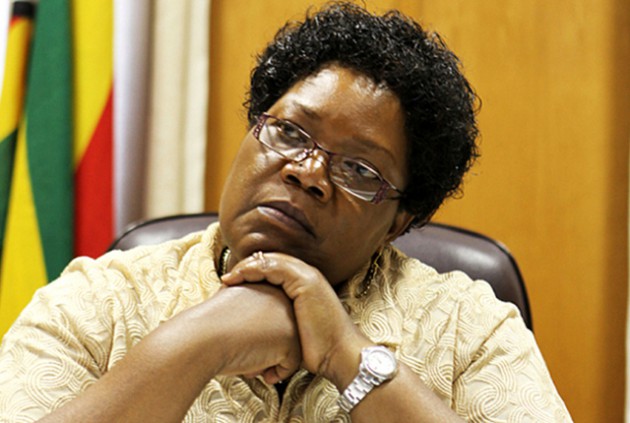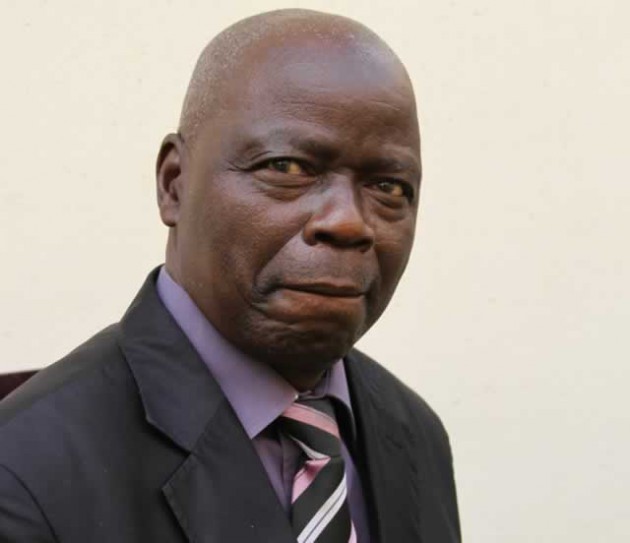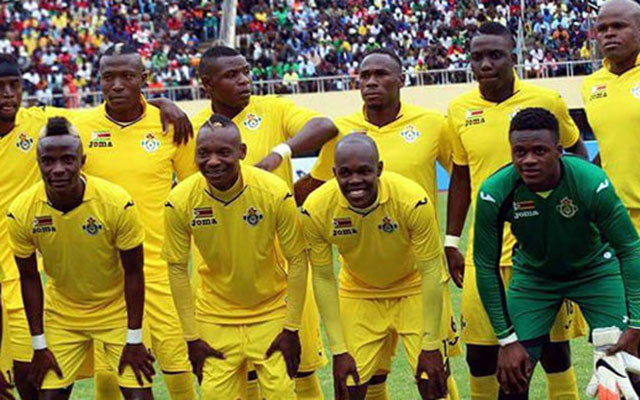History: None but themselves!


Mujuru
Nathaniel Manheru: THE OTHER SIDE—
IT has been a week of laughter and good political humour, not least because my party triumphed in Bikita West, but also because of the clotted reasoning and prose which this defeat wrought in losers. It is a bit unkind to continue to mention names of the already distressed, but the week showed how necessary illusions are in politics, more so when one’s cause hits the nadir.
Quite amusing was a gallant but failed attempt by ZimPF to summon numbers and mathematics in order to salvage a line of dignity from the jaws of defeat, but whose coming was all too obvious. The miserly two thousand or so votes scratched, we were told, “matapulayid” by a factor of total number of constituencies in the country, and then compounded by the factor of forty or so opposition parties working together, would certainly deny President Mugabe 50+1 percent he so badly needed to form a government in 2018, thus indubitably demonstrating the soundness of politics of building a grand opposition coalition ahead of, and in readiness for, 2018! Where figures were dispensed with, you were treated to equally knotted reasoning which vehemently said why judge Mujuru on the basis of Masvingo when her bastion has always been Mashonaland East and Central!
State-of-defeat address
Capping it all was the defeated Grand Lady’s State-of-Defeat Address whose parting shot, ironically was Zanu-PF’s “Iwe neni tine basa”! Still more was coming, this time from pseudo-commiserating MDC-T. Having made sure its leader was evacuated as far away from Bikita West as the national territory allowed, all to make sure he was safe from the “fleas” of the Bikita West defeat, the MDC-T, clearly summoned its utmost imagery, all to rub it in: “The president (Tsvangirai) said one swallow does not make a summer and Bikita West is the swallow . . . we have already decided to do a cow-horn formation on Zanu-PF!” Kikikiki!
Stylistically, it is called mixing metaphors, itself an abomination in the Great Queen’s language! The Political Science Department isn’t doing too well on the tender mind it has been mounding, a mind straining rather too hard to make a vivid impression on the political landscape. How one swallow which can’t make a summer can still make a grand opposition coalition or, worse, acquire enough horns to do a “formation” on Zanu-PF, only the miracles of the weeks ahead will certainly show.
Of course we got the message very loud and very clear: only when the shallow – oops – swallow grows Shaka’s encompassing horns will it then happen got Runaida! But the absurdity of hunting for a Tonga family grieving from a lighting bolt! I suppose Mhofu (goodness me, it’s my totem!) will vaingloriously say another “cow-horn formation” on Zanu-PF’s Command Agriculture!
Mujuru-must-go mantra
In the meantime the pseudo-placidness of ZimPF has since been ruffled by great, uncontrollable perturbations from this defeat! Big Makova has resigned. Mavhaire and his sidekick – Bhasikiti – are boiling with anger. Why was our advice disregarded, they ask? The advice against participating in the ill-fated by-election!

Mavhaire
Meanwhile their latest counsel is no different from that which saw the makeshift party (no congress done!) diving headlong into Bikita West: they are craving for yet another defeat in Mwenezi, and one set to come soon! Well, Bhasikiti, more accurately Professor Lule, comes from there, ahh more accurately plucks mangoes from there for a livelihood! And again it is a horror scenario for the poor Grand Lady of the helicopter fame: she loses another by-election (as she will), and she consolidates her image as a serial election loser; she wins the by-election (as she won’t), and the Mavhaire wing guns for the ultimate: ZimPF leadership! The “Mujuru-must-go” mantra drops so easily from Mr Boiling’s restless lips. A real boil he shall be on the Grand Lady’s backside.
Passing the voting process
But the lack of messaging discipline is staggering. The defeated candidate is quick to concede, quicker to congratulate the winner who is a relative! Equally, Rugare Gumbo acknowledges the result with equanimity. All told, the subtext is clear, very clear: the electoral process is free, fair and a genuine expression of the will of the voter. Exactly the resume Zanu-PF needs ahead of 2018!
I mean, you cannot have the same process delivering welcome victory to Mliswa; then handing satisfactory defeat to Madhuku; and a just desert to Mujuru, only to become grossly unjust, unfair, unfree in 2018. As the Twitter Professora would say, handei tione! In the meantime DD is already in the basket, baptised as Zapu presidential candidate for 2018!

Mliswa
Neukuwo Temba who until recently was hoping to punt for Strive Masiyiwa is drawing up a list of mighty “independents” for 2018. Not to mention Trevor Ncube and his Manyika/Mawarire political contraption! The courts granting affected businessmen leave to haul NERA to court. Mwonzora awaiting judgment of the Law Society of Zimbabwe. And Code? NERA? Haa-a, zvinoda kupamhwa izvi: handei tione!
Riva rine ngozi iri!
I have written quite a lot on history, specifically written about the need for us to have a good, firm grasp of our history. Each time I make that call, I sound outlandish, sound very much like some starry-eyed academic romancing dead facts, groping a stale, fossilised past. Very few seem to know that a mis-known history undoes a people, that it can every destroy destroy a nation.
The best analogy I can summon comes by way of a song by the late Joseph Mutero: that genius we have since forgotten, and who led the legendary Zvishavane Sounds. Apart from “Mutongi Gava Maenzanise”, he gave us another sumptuous song titled “Riva Rine Ngozi Iri”.
I wonder how many of us still remember that beauty, what with our “now-now” deejays who think “golden oldies” belong exclusively to the Western music tradition! As with many of our leading compositions, “Riva Rine Ngozi Iri” (This Ominous Mousetrap) taps from our story-telling oral song tradition.
The mouse that needed some help
The song is about a hapless mouse which approaches different animals, all of them bigger and domesticated, for support in undoing a dangerous trap set by the angry home-owner against its kind notorious for damaging his field and already barned crop. First to be approached was cockerel: “My dear friend cockerel, help me trip this trap; it is dangerous.”
Unconcerned, the cockerel told the little mouse off, adding he was busy minding the flock to worry about concerns of rodents. Distraught, the mouse left. Before long, he reached the he-goat sniffing the backside of its expectant “girl”. “My dear friend he-goat, please help me trip this trap; it is dangerous.” “Come off it,” replied the horny he-goat, “this is a trap for mice, not for us goats.Solidarity does not include fasting for a hungry neighbour!”
Again, the hapless mouse left, moping its brow and hoping for kindness elsewhere before long. Then he sighted a black bull grazing along the lush ridges of the angry farmer’s fields. “My dear friend Mombe, this trap set to finish my kind, come help me trip it so my kindred may also see tomorrow, live longer like all species of this earth!” Bellowing between mouthfuls, the big bull advised the little rodent to fight its woes alone. Dejected, the mouse went home, haunted by a sense of complete doom.
First the cockerel, then the he-goat
Early morning, the expectant farmer went to check on the mousetrap. Finding the flat stone tripped, he rushed to lift it, hoping to find a dead mouse. But alas, upon lifting the flat stone, a huge angry cobra that had been hurtfully trapped under the stone struck the unsuspecting farmer right on the forehead. The farmer fell with a loud wail that awoke the village, his wife foremost. By the time his heavy body reached the cool musasa shade, the bite had spread, going all the way up the spine, coagulating his already poisoned blood.
A handful of concerned villagers had already gathered, and all concluded the bite would go far, very far. They stayed with the family, consoling it until lunchtime, and even beyond. They had not eaten, many of them having come straight from their fields, or some such summer chores.
“Chase down the cockerel,” said the bitten man’s young brother, “so we have some relish to feed friends and neighbours who have come to commiserate with us.” Before long, the unconcerned cockerel had turned into a sumptuous dish of chicken for all to feed.
But the word travelled, covering the outer reaches of the village. More sympathisers came, overwhelming the affected family. More mouths needed to be fed, for the bitten man was a well-known farmer, whose home was a place of plenty.
“The crowds have clearly swollen,” again said the bitten man’s young brother. “The he-goat should provide relish so everyone is well fed.” Before long, the he-goat would sniff no more, its bearded head having been severed. The commiserating village was treated to morsels of sadza, accompanied by juicy portions of goat meat pincered between left hand fingers.
The small mouse that counted
The condition of the bitten man took a turn for the worst, his whole body now stiff, dark and wholly poisoned. Before long, he was dead. The village wailed. Relatives from all corners of the country converged to pay their last respects. And as required by custom, the dead man had to spend a night in his home, issuing last orders, bidding his grieving household a final sad goodbye. He had to have a last look at the home, before his final journey out of this world to the one beyond.
More mouths needed to be fed, for longer, which meant more meat, bigger pots, larger fires, more cooks. “Ahh, my brother was a man of means and great reputation. When a great man falls, stomachs must remember. The big black bull, let it be slaughtered to accompany the dear and famed departed!”
Already nominated by mute custom as the surrogate father, the words of the bitten man’s young brother were heard and duly obeyed. In no time the big black bull was twitching its last, the bitten man’s sons-in-law hard at work skinning it, dismembering it for the pot.
Amidst all this drama, the little-noticed mouse diligently counted the fallen: first the cockerel; then the he-goat and, finally, the big black bull that had dismissed the mousetrap as none of its concern. All three, now fallen. Eaten and soon to be pushed out as smelly dung.
Coltart who wrote
Late last year, one David Coltart released a book titled “The Struggle Continues: 50 Years of Tyranny in Zimbabwe”. This column gave an initial reading of its first 13 chapters, promising to find time and space to do the rest. That time, that space, was never found. But a clear warning had been communicated to my readers: riva rine ngozi iri! This is decidedly an ominous mousetrap, the piece opined. The deception was multiple

Coltart
Foremost, its title which tapped from our wartime jingo: the struggle continues! David Coltart fought for the supremacy of racist white Rhodesia, defended white settler interests by gun; which means he resisted our freedom and black statehood by gun. Lots of unpleasant things happened during our war of Independence, much of them washed away through the black man’s large, forgiving heart.
We called it Policy of National Reconciliation, by which the injured black man reached out to his erstwhile persecutor, his continuing oppressor, to offer a hand of peace, but one which went unrequited. Or simply washed by the black man and woman’s enhanced amnesia, for which we are famed.
The hand that shot, the hand that wrote
In that part-review, I wondered with loud disbelief how it was that David Coltart’s gun never fired, never shot at a black target, then his enemy, throughout that protracted conflict. The closest he came to revealing the atrocities of White Rhodesia was a short but vivid episode set in Chiredzi where, as the man assigned the grisly task of finger-printing cadavers of shot “terrorists”, he allowed his curiosity to carry him beyond the morgue, to a disused mineshaft into which the remains of killed Africans were flung and dumped, soon to be sealed and forgotten, part of a rotting pile of nameless victims of a forgotten racial conflict.
Fast forward to post-independence, and one finds the same David Coltart exhuming bodies from mineshafts in areas to the southern part of our country. But unlike the pre-independence mine-shafted cadavers, these ones had to be named, remembered and atoned for. Had to be narrativised. The result was “Breaking Silence”. Through my restless pen, I still wondered.
Wondered why two deaths, which could even be one, or two that could have overlapped, deserved differently, needed contrasting atonement. Wondered why two wars, perhaps one, maybe two overlapping wars, yielded two sins: one readily cleanse-able, another that could not be atoned for, that could not be forgiven, let alone forgotten. Wondered how the hand that held the gun could re-emerge wielding the pen of history, rearranging facts, in the process boldly granting forgiveness to itself, trenchantly apportioning everlasting guilt to the other side which, like itself, also fought a war, killed or was killed.
Binary view of history
Even more significant were revelations of networks of contacts of Empire which “The Struggle Continues” revealed. Clearly David Coltart is well-connected in the white world to which he belongs anyway. Contacts in the US, contacts in Britain, Germany, the EU, the Nordic bloc of countries, you name it. Funding gushing from all over the white world. But also a network in white South Africa, much closer home.
Again I sounded a warning: riva rine ngozi iri! Give it to him: he does not hide that these conducts are real, living and thus usable in the present, and in future “struggles”. It’s not like he was exhuming the Ken Flowers, the Reid-Dailey, the Peter Walls of a forgotten war. He was giving this our un-reading Nation a list of his living contacts on whose strength and support he would brew future troubles. Including local contacts, players, some deeply embedded in Zanu-PF’s highest governing echelons this very day.
Go read “Struggles” if you think I am politicking. But there is more to check. The funding of the book; its launch. It’s endorsements and, surprise, surprise, it’s local, serialised treatment here. Picture our nation’s binary sensibilities when it comes to its history: The Patriot serializing the late national hero Brigadier Felix Muchemwa’s “The Struggle for Land in Zimbabwe: 1890-2010”; The Standard serialising David Coltart’s “The Struggle Continues: 50 Years of Tyranny in Zimbabwe.” Both serials of ‘struggle’, that vexatious noun. Nothing could be starker yet, ironically carrying the same lexicon! Still that’s not my main point. Let green undergrads looking for dissertation topics focus on that; I am not one of them.
The missing hag, the hyena vomit
Coltart makes it clear his book is a political investment for 2018, the year Zimbabwe decides. Much like “Dinner with Mugabe” which made sure its birth was in early 2008. Maybe that, too, is not bothersome. What I find quite significant, worrisome in fact, is the way “The Struggle Continues” indeed continues into, and connects directly with, the declassification of CIA reports covering just about the first half of Coltart’s book.
And the springing from the woodworks of one Stuart Doran, a fellow Briton who introduces himself as “an independent historian and author of a forthcoming book based on new documentary material – Kingdom, power, glory: Mugabe, Zanu and the quest for supremacy, 1960-1987”. True CIA’s decision to declassify documents is a function of the calendar, even though the underlying reasoning is that time will have healed the wounds, and killed protagonists featured in the documents.
The CIA never declassified what is still fresh for its body-politic. However, the apparent show and speed of synchronisation with white writers here, writers with definite positions on our national politics, is what I found amazing, what I think is worth thinking about. The Shona people have a saying for such fraught coincidences: chembere yonyangarika, bere rorutse mvi (the village hag vanishes, and the gorged hyena vomits white hair)!
Defending white way of life
I am getting closer to the gist of my piece. Just who writes history for us? Just who reads history for us? How do we reconstruct our past for purposes of understanding it, and learning from it? Or for purposes of avoiding its down-side, its pitfalls? Easy reading of this piece will suggest I am taking cheap pot-shots at white Rhodies. Or that I seek to lighten the conflict which engulfed the southern part of our country soon after our Independence. I seek neither; I blush for neither.
I was part of the war effort towards the overthrow of white settler Rhodesia. I consider that war just, holy, a heroic, founding process of this our nation. It is hard to find Rhodies who emerged clean from that war, however critical they may have been of Ian Smith and his ruling bandits. From the perspective of white Rhodesians, the war was “about preserving and defending our own way of life”. That life, wholly racially patrician, was founded on the oppression and suppression of the African.
On the denial of our humanity, our rootedness in this land. Hardly any white living then opposed white supremacy; a handful definitely opposed the Rhodesia Front model of enforcing that supremacy. Let that important distinction be well grasped, especially by blacks of this country who risk re-living that nightmarish episode of history.
Interned by two great men
The early post-independence conflict in the southern part of the country largely played out when I was a student. I witnessed the drags of it when I started working, soon after the completion of my studies. Thankfully I was placed in an office where I was part of the secretive talks that brought about the Unity Accord of December 22, 1987.
Much more, I was right in the thick of things when Joshua Nkomo and Robert Mugabe – our iconic two leaders – walked the length and breath of this land in order to make the Accord stick, to win back the peace that had eluded us, throwing us into the leaping flames of a senseless conflict that must never recur. Today I know Matabeleland and Midlands like the back of my hand, but the beginnings of it was at a tender age when I had the privilege of accompanying the two great men as they criss-crossed the land to win and cultivate peace for an otherwise buffeted land.
t was not easy; it was not an overnight wonder, and some day, some day, I shall have the chance to eternalise my modest view and account of events of that time, in some book which I cannot pen just now. So, I repudiate facetious readings from men and women pursuing ersatz politics. Real, deep politics were undertaken then, by men and women who had fought a war, seen comrades fall, and by dint of all that, who knew the value of peace and national unity. Not this mess we read nowadays, masquerading as thoughtful national politics.
When counting is futile
I spent the greater part of this week going through fat files declassified by the CIA and covering that stretch of my country’s story. The English is plain, the meaning apparent. The causes of the conflict are attempted; the figures of casualties are hazarded. If it mattered, I would have told you, dear reader, that the Americans worked with the figure of a thousand or so dead from that conflict. Maybe a little more.
But it does not matter, for our Nation is now a thousand less, assuming that is the correct figure. And there is no reason to think it is. Life is too sacred, none of it too unimportant to be lost. The same reports also record casualties of those who spoke Shona, or were thought to support Zanu then. They detail destruction of property and equipment, rape and harsh treatment of civilians by both sides to the conflict. More important, they dwell elaborately on whites who got killed: from tourists to farmers.
It is not difficult to tell where America’s sympathies lay, especially after white killings, and the meddlesome involvement of apartheid South Africa. If it mattered, too, I would have told you that Coltart’s book does not count the dead, whether in “Breaking Silence” or in “The Struggle Continues”. Both leave that issue open, understandably so. For me all that fascination with figures is unimportant, futile even. No war has ever yielded accurate statistics, not even our war of national liberation. Need I remind you that in any war, the first casualty is truth? Worse mathematical truth.
US for us?
What I find staggering is the ongoing attempt to conflate CIA declassifieds with truth. With history. Our history! Ahh! It’s not like the declassified documents are some propaganda masterstroke. They openly proclaim that they are “sanitised copies approved for release”. And these are not my words; CIA words. They openly give you blank pages yelling “Page Denied”. Or its variant: “Pages in Document Denied”.
To all that add rectangular boxes that denotes major expurgations. “Redactions” to use CIA’s favourite word. Add to all that the fact that this was a CIA officer’s view, clearly limited, and in the case of material under discussion, jaundiced by Cold War politics, and a tribal perspective on African politics. Jaundiced, too, by a pro-white, pro-apartheid vantage point. Above all, an American self-serving perspective. We call that our history?
We call that workable, reliable material for reconstructing our past? A basis for judging one another today? Buttressed by Coltart and Stuart Doran, whoever he is, and we think we are all the richer for it? What is “an independent historian”? What struggle does David Coltart say “continues”? Your struggle? My struggle? Our struggle? What are the new “facts” which have been revealed? By the CIA? My goodness! If that is how we read ourselves, read and write our past, then God help us. To all yell: None But by Themselves for Us? US for us? Uuuh, Riva rine ngozi iri.
Icho!










Comments